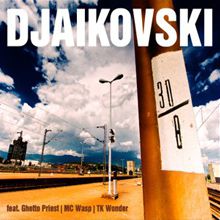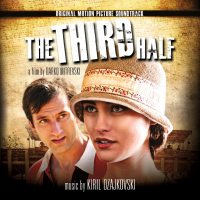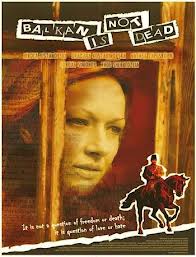Home » Jazz Articles » Multiple Reviews » Kiril Djaikovski: West Meets East
Kiril Djaikovski: West Meets East
Having blazed a trail in the 1980s, playing keyboards for two seminal Bands, and in the '90s with his DJ-led mix of brittle break beats and flowing Macedonian grooves, Djaikovski released several compelling and intelligent albums. His unique mixture of western dance and hip hop with traditional Macedonian forms produced tracks which varied from sublime break-beat workouts to experimental techno numbers and instrumentals.
As a classically trained musician, he has been composing soundtrack music from the very start of his career as a professional musician, when he formed the electro pop band Bastion. His soundtracks are as sensitive and evocative as they are timeless. His music often plays a decisive role in shaping the emotional climate of the films it serves. Both worlds and its backgrounds suggest a rich and prolific output, and the breadth of Djaikovski's musical interests and styles, while immersing himself in the act of music-making.
 Kiril Djaikovski
Kiril DjaikovskiDjaikovski EP
KDZ Music
2012
Like a mad scientist burning the midnight oil in a secluded laboratory, Djaikovski spent countless hours in his home studio experimenting with his computer, mixing electronic sounds with contributions from his live band, thus creating music that ranks among the most challenging he has ever created. The Djaikovski EP is the forerunner for the announced new album with electronic music that has been in the works for several years-an album that helped to break British singer/songwriter Peter Gabriel's infamous record for the time length between albums-while touring the world endlessly. Most of this material, including the tunes for his forthcoming album, were premiered and road-tested on numerous gigs, and finally this material is premiered as a studio recording.
This six-track EP sees Djaikovski collaborating with hip hop vocalists Ghetto Priest, TK Wonder and MC Wasp, also including other members of his live band, The Dream Team: percussionist Goce Stevkovski and violinist Vladimir Krstev. This multitalented crew delivers an impressive and ambitious amalgam of Djaikovski's previous leanings, meshing streetwise dance production with traditional Macedonian and Gypsy sounds, courtesy of the Serchuk Orchestra, resulting in music that's more danceable and adventurous.
Djaikovski EP is no pillow-soft electronic music and, at times, it may sound like a headache-inducing array of repeated musical phrases and mind-numbing loops without the musical flow that garnished his last album, Homebound (Tone Casulties, 2000). But Djaikovski's great craftsmanship in blending the modern and old makes Djaikovski EP seductive-and one of his best efforts yet at blending electronic sounds with traditional.
 Kiril Djaikovski
Kiril DjaikovskiThe Third Half
KDZ Music
2012
For the soundtrack to his World War II-inspired movie, The Third Half, director Darko Mitrevski, reunited with Djaikovski, who also provided the music to 2005's Balcancan. (Minerva Pictures Group). Inspired by true events from World War II in occupied Macedonia, The Third Half tells the tale of a soccer club led by a Jewish coach that, in 1943, victoriously roamed through championships in the Nazi soccer league. Indirectly, the film deals with the fate of 7,200 Macedonian Jews who were sold and deported to concentration camps.
Despite the context of a brutal tale and dreamy film production, Djaikovski has channeled his trademark of classicism and innovation into an exhilarating gem of a soundtrack. The nostalgic mood is but one of many on the album; Djaikovski successfully imposes a broad emotional spectrum, something at which he has always excelled, like on the "Samovila's Birthday," or the waltz-driven "The Story of Dmitry."
As the soundtrack progresses, it seems to flourish even more; on both "Two Halves" and the traditional "More Sokol Pie (Behold a Falcon is Drinking)," Djaikovski is unafraid to bend a little towards romanticism in his arrangements. "Remember me Papa" is a delicate pairing of deceptively simple melodies with chamber music accompaniment. Since the movie is based upon the memories of a character, the music is an evocation of experiences and emotions.
This soundtrack provides a masterful backdrop for Mitrevski's film and also makes for fascinating listening in its own right while, once again, separating Djaikovski from more predictable composers.
 Kiril Djaikovski
Kiril DjaikovskiThe Balkan is Not Dead
KDZ Music
2012
Musicians and filmmakers are both in the business of telling stories, and there is no greater joy than when they lock in with one another. Dzajkovski and renowned theater/film director Aleksandar Popovski have forged a spectacularly potent working relationship in the last few years, resulting in countless plays staged all over the world. It was no surprise, then, that Popovski once again reached out to Djaikovski to score The Balkan is Not Dead , his second feature film after the joint directorial effort with director/writer Darko Mitrevski on 1998's Goodbye to 20th Century (First Partisan Production)
The swirling, symphonic sounds of the opening "Love or Death" set the tone for a grandiose soundtrack with pronounced inward qualities. The compositions provide an interesting marriage of contrasting styles and moods, full of lamenting string-borne melodies. In these intensely melodic compositions, created from a delicate balance of instrumental colors, the music ranges from elegant waltz to lush string movements. The lyrical "One Edelweiss" and "Osman," for example, slow the heart before breaking it. Djaikovski has paradoxically created music possessed of both vivid realization and withdrawn beauty, music that speaks to loss, destruction and survival.
As with all of Djaikovski's soundtrack work, the music can be enjoyed as a total listening experience rather than digesting each track separately. This is a welcome approach, given current trends that emphasize a few songs/compositions at the expense of the album's totality. That the emotive beauty of his music can be experienced without seeing the films makes Djaikovski's music even better. His works confirms that the best soundtracks are those that stand independent of their sources.
Tracks and Personnel
Djaikovski EP
Tracks: Ghetto Life; Hell of a Road; Spin Off; Lie To Me; Sceptic; Lion's Den.
Personnel: Ghetto Priest: vocals; TK Wonder: vocals; MC Wasp: vocals; Serchuk Alimov: trumpet; Djengis Kadriev: saxophone, clarinet; Vladimir Krstev: violin; Nijazi Alimov: baritone; Goce Stefkovski: percussion; Nora Loloska: ethnic vocals.
The Third Half
Tracks: Samovilla's Birthday; The Story of Dmitry; Two Halves; More Sokol Pie; Remember Me, Papa; End Credits.
Personnel: Macedonian Radio Symphonic Orchestra; Oleg Kondratenko: conductor; Dzjian Emin: conductors: Vladimir Krstev: solo violin; Vladimir Krstev: additional orchestration; Marko Videnovic: additional orchestration; Dzijan Emin: additional orchestration.
The Balkan is Not Dead
Tracks: Love or Death; One Edelweiss; Eleni's Waltz; Osman; Sudnica.
Personnel: Macedonian Radio Symphonic Orchestra; Oleg Kondratenko: conductor; Vladimir Krstev: solo violin; Vladimir Krstev: additional orchestration; Marko Videnovic: additional orchestration.
< Previous
Jacaranda
Next >
I Love Lee
Comments
Tags
Kiril Djaikovski
Multiple Reviews
Nenad Georgievski
Macedonia
Return to Forever,
Herbie Hancock,
Brian Eno
KDZ Music
For the Love of Jazz
 All About Jazz has been a pillar of jazz since 1995, championing it as an art form and, more importantly, supporting the musicians who create it. Our enduring commitment has made "AAJ" one of the most culturally important websites of its kind, read by hundreds of thousands of fans, musicians and industry figures every month.
All About Jazz has been a pillar of jazz since 1995, championing it as an art form and, more importantly, supporting the musicians who create it. Our enduring commitment has made "AAJ" one of the most culturally important websites of its kind, read by hundreds of thousands of fans, musicians and industry figures every month.


















